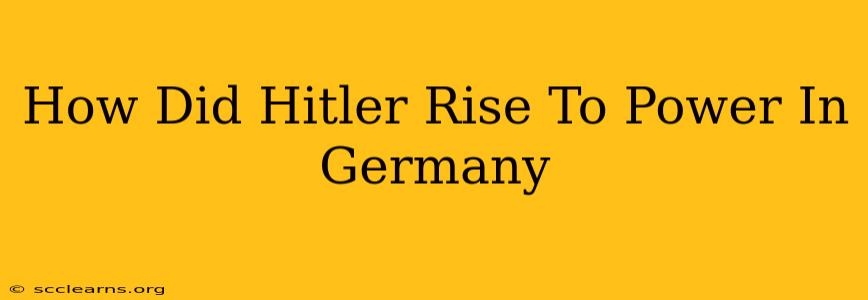The rise of Adolf Hitler and the Nazi Party to power in Germany is a complex historical event stemming from a confluence of political, economic, and social factors. Understanding this ascent requires examining the tumultuous period following World War I and the weaknesses within the Weimar Republic.
The Post-War Crisis: A Fertile Ground for Extremism
Germany, after its defeat in World War I, faced immense challenges. The Treaty of Versailles, imposing heavy reparations and territorial losses, fueled resentment and national humiliation. This widespread feeling of betrayal and injustice created fertile ground for extremist ideologies, including Nazism. The economic instability of the Weimar Republic, marked by hyperinflation and widespread unemployment during the early 1920s, further exacerbated the situation. People were desperate for solutions, and the Nazi Party offered a seemingly simple and powerful answer.
Exploiting Economic Hardship:
The Great Depression of 1929 hit Germany particularly hard, deepening the existing economic crisis. Unemployment soared, pushing millions into poverty and despair. Hitler and the Nazis skillfully exploited this economic hardship, blaming the Weimar government, Jews, and communists for the nation's problems. Their message of national revival and economic recovery resonated with many disillusioned Germans.
The Nazi Party's Effective Propaganda and Organization
The Nazi Party was highly effective in its propaganda efforts. Hitler's charismatic leadership, coupled with the party's well-organized propaganda machine, successfully disseminated their message to a broad audience. They utilized rallies, posters, newspapers, and radio broadcasts to spread their ideology, emphasizing promises of national greatness and scapegoating minority groups.
The Power of Propaganda:
Nazi propaganda was carefully crafted to appeal to various segments of German society. They targeted different groups with tailored messages, exploiting existing prejudices and anxieties. Their propaganda was not merely persuasive; it was insidious, shaping perceptions and manipulating emotions on a mass scale. The effectiveness of this propaganda campaign was a crucial element in their rise to power.
Exploiting Political Instability:
The Weimar Republic's parliamentary system was inherently weak and prone to instability. Frequent changes in government and a fragmented political landscape created opportunities for the Nazis to gain influence. They skillfully used legal means to achieve their goals initially, participating in elections and forming alliances with other parties.
The Enabling Act: A Turning Point
A pivotal moment came with the passage of the Enabling Act in 1933. This act, passed by the Reichstag (German parliament), granted Hitler extraordinary powers, effectively dismantling the Weimar Republic's democratic structures. While technically legal, the act was achieved through intimidation, manipulation, and the suppression of opposition voices. This marked the transition from a relatively democratic system to a totalitarian dictatorship.
The Role of Fear and Violence:
The Nazis used intimidation and violence to suppress their opponents. The Sturmabteilung (SA), the Nazi paramilitary group, engaged in street violence, intimidating political opponents and silencing dissent. The creation of the Gestapo, the secret police, further consolidated their power, creating an atmosphere of fear and control.
Consolidation of Power:
Following the Enabling Act, Hitler systematically consolidated his power, eliminating political opponents and establishing a totalitarian regime. The Night of the Long Knives, in 1934, saw the elimination of potential rivals within the Nazi Party itself, further solidifying Hitler's control.
Conclusion: A Recipe for Disaster
Hitler's rise to power was not a sudden event but a gradual process, fueled by a perfect storm of post-war resentment, economic hardship, political instability, and the Nazis' effective propaganda and use of violence. The weaknesses of the Weimar Republic, coupled with the manipulative tactics of the Nazi Party, paved the way for one of history's most catastrophic regimes. Understanding this complex interplay of factors is essential to comprehending the horrors of the Nazi era and preventing similar events from happening in the future.

